How to See What Google Knows About You: Examine and Modify Your Information
Google knows a lot about its users, and that’s not a secret — the company collects personal information and tracks users through Chrome, Google Search, Google Play apps, Google Maps, YouTube, and more. The good news is that you can adjust your Google controls and settings to prevent them from accessing your data. Find out how to stop Google from collecting data in this blog post.
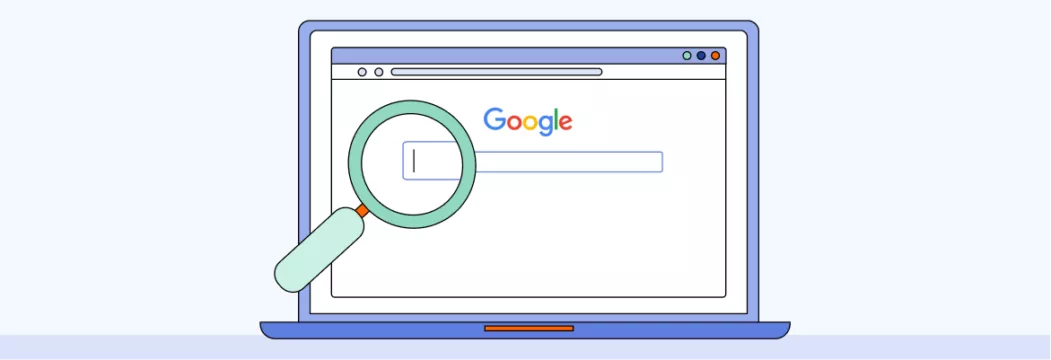
What Google knows about me?
Google collects a lot of information about you, mostly from your Google activity history. So if you sometimes ask yourself the question “What Google knows about me?” then the following list will finally shed some light on this:
- Personal information, including your name, phone number, gender, date of birth
- Your email addresses
- Your residential and workplace details
- Your interests
- Your search history
- Websites you visit
- Videos you watch
- Ads you interact with
- Your location and places visited
- Device information
- IP address and cookie data
- Your YouTube search history and recently watched videos
- Your interactions with the Google Assistant, including through smart speakers
Why does Google collect your data?
In a nutshell, it’s all about ads, “personalizing” your experience, and making money. Google gathers all this info so that thousands of advertisers can bid on showing you ads based on your sensitive personal details.
Why is this a problem?
Well, some folks might not mind Google having info about them. It’s the price we pay for using their free and easy-to-use products. But remember, your data is valuable, and you have the right to protect it, especially if you’re unsure how it’s being used or who’s getting their hands on it.
Plus, there’s always a risk that cybercriminals could get hold of your data. Even Google isn’t immune to data breaches — for example, the data of over 500,000 users was compromised on a former social media network Google+ just a few years ago. Also, if Google has your info, they might have to hand it over to the government if asked: if you live in a country like the US, your data might end up shared with other governments like Canada, Australia, New Zealand, and the UK. All because of agreements made between international intelligence alliances.
Now, can you see what Google knows about you?
What specific data does Google track?
Google is required to disclose the info they collect on their users. So, to check if Google knows everything about you, you need to access your Google settings and explore a bit.
To see what Google knows about you, check out the list of all the data stored in your Google Account:
- Go to your Google Account.
- On the navigation panel, select Data & privacy.
- View data acquired by Google apps you use and content saved from Google services.
- To see data for each specific service, go to Things you’ve done and places you’ve been. Manage and change settings for each service by selecting the arrow next to it.
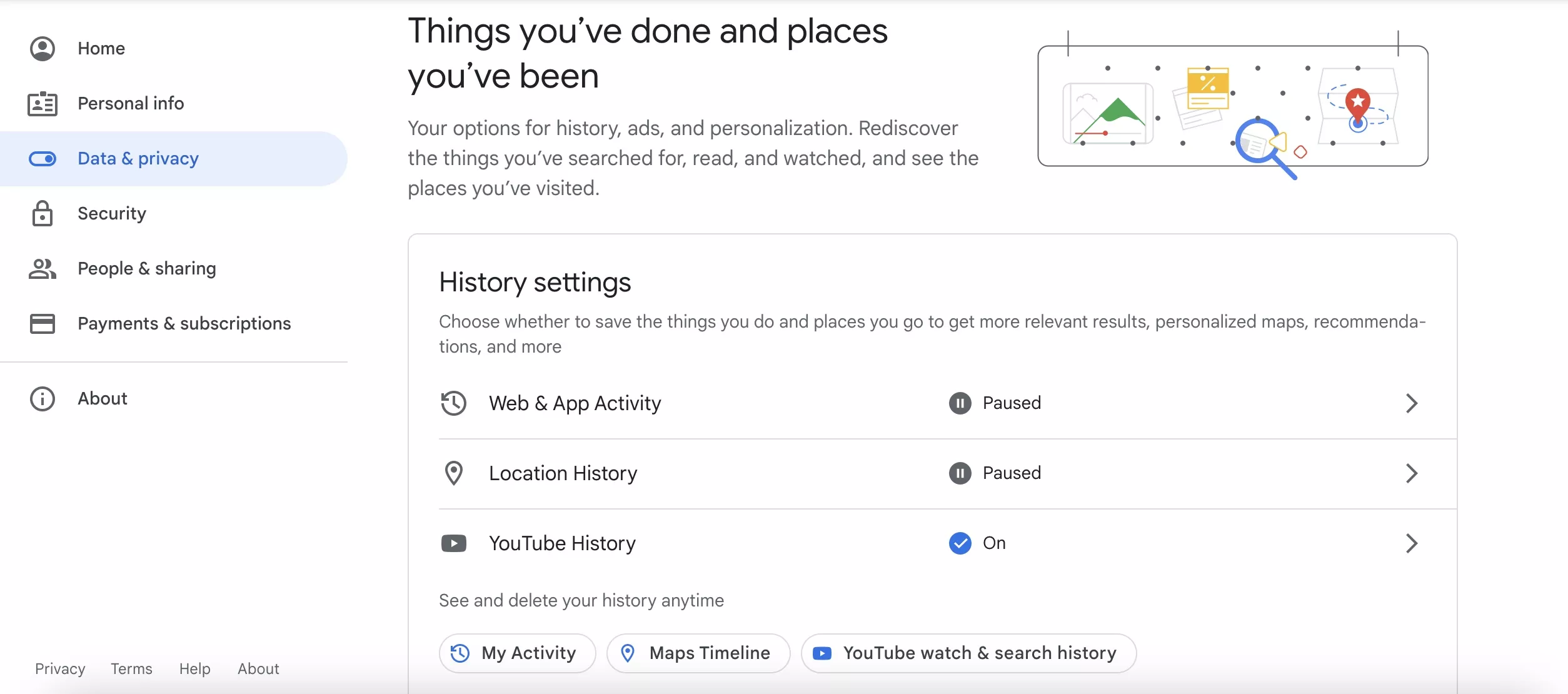
You can see your websites and apps activity, location history, and YouTube history if those are enabled in the first place. Google promises that turning on these settings will give you faster searches and more personalized experiences in Maps, Search, and other Google services. But of course, this comes at the cost of your online privacy. Luckily, you can manage it.
How to stop Google from tracking me?
It’s the question well worth asking when you see a ton of information the company has on its users. If all of this feels a bit too intrusive, don’t worry. There are steps you can take to protect yourself and your data.
Turn off ad personalization
One of the best ways to stop Google from collecting information about you is to disable ad personalizations. While convenient, they negatively affect your online privacy, building upon your web history, location, and preferences.
To turn off ad personalizations, follow the steps below. Be warned, though, that Google and other tech companies may try to persuade you to leave them on and claim it will negatively impact your experience. But in reality, they just want to target you with specific ads.
- Go to your Google account.
- Select Manage your data & privacy under Privacy & personalization.
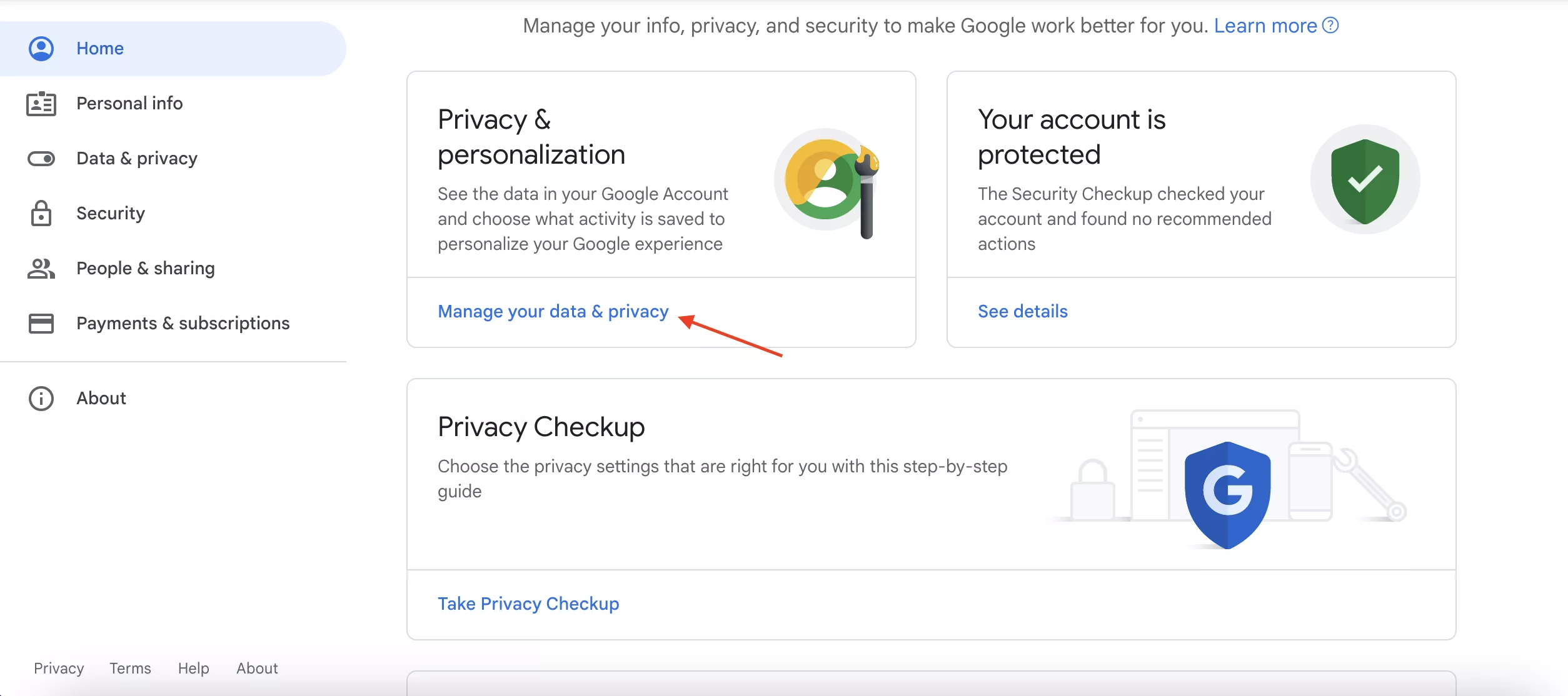
- Scroll down to Personalized ads.
- Choose My Ad Center and toggle the switch to Off.
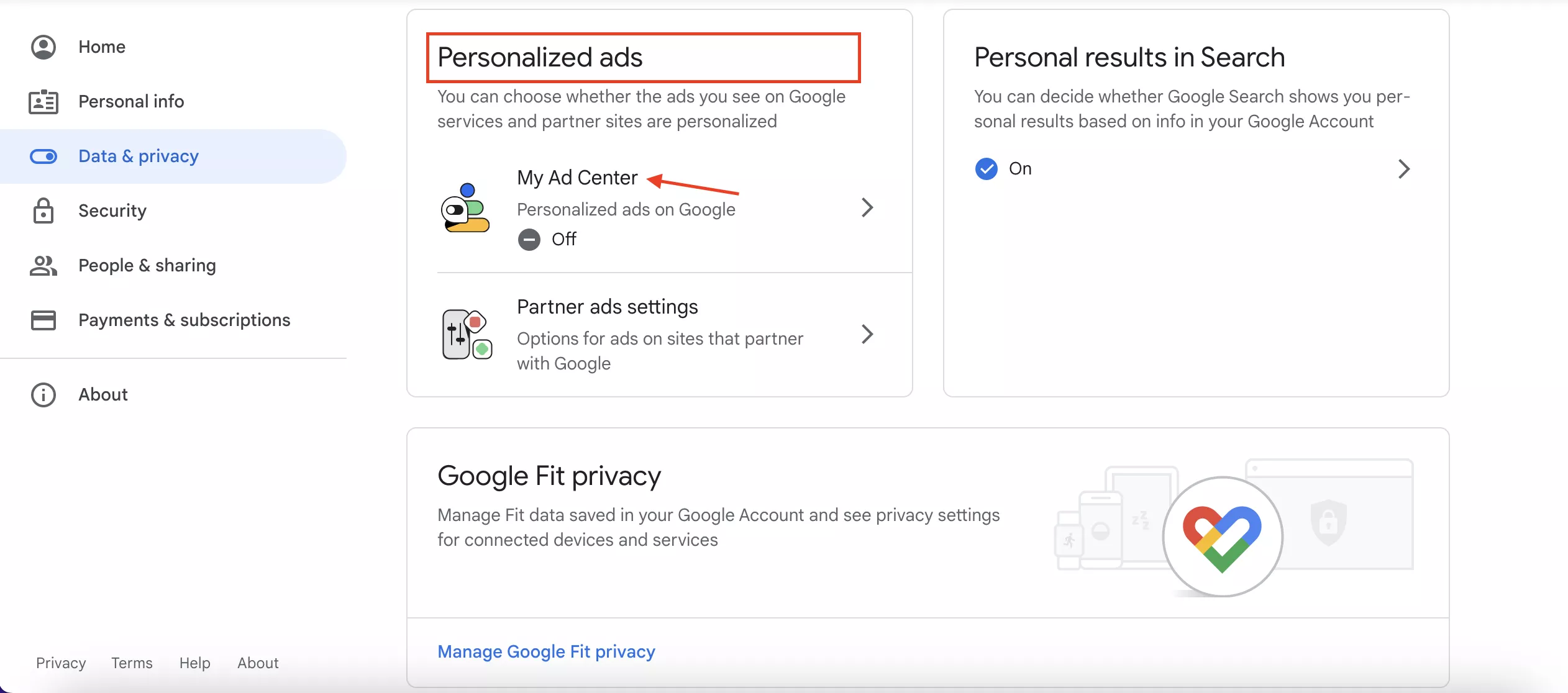
Disable location history
Search histories are like a big tracking log, keeping tabs on everything you’ve searched for using Google. It’s like a peek into someone’s interests and personality. That’s why watching out for your location history is crucial. Here’s how to stop Google from tracking your location.
First, check your location history status:
- Go to your Google account.
- Select Data & privacy.
- Scroll down to History settings and choose Location History.
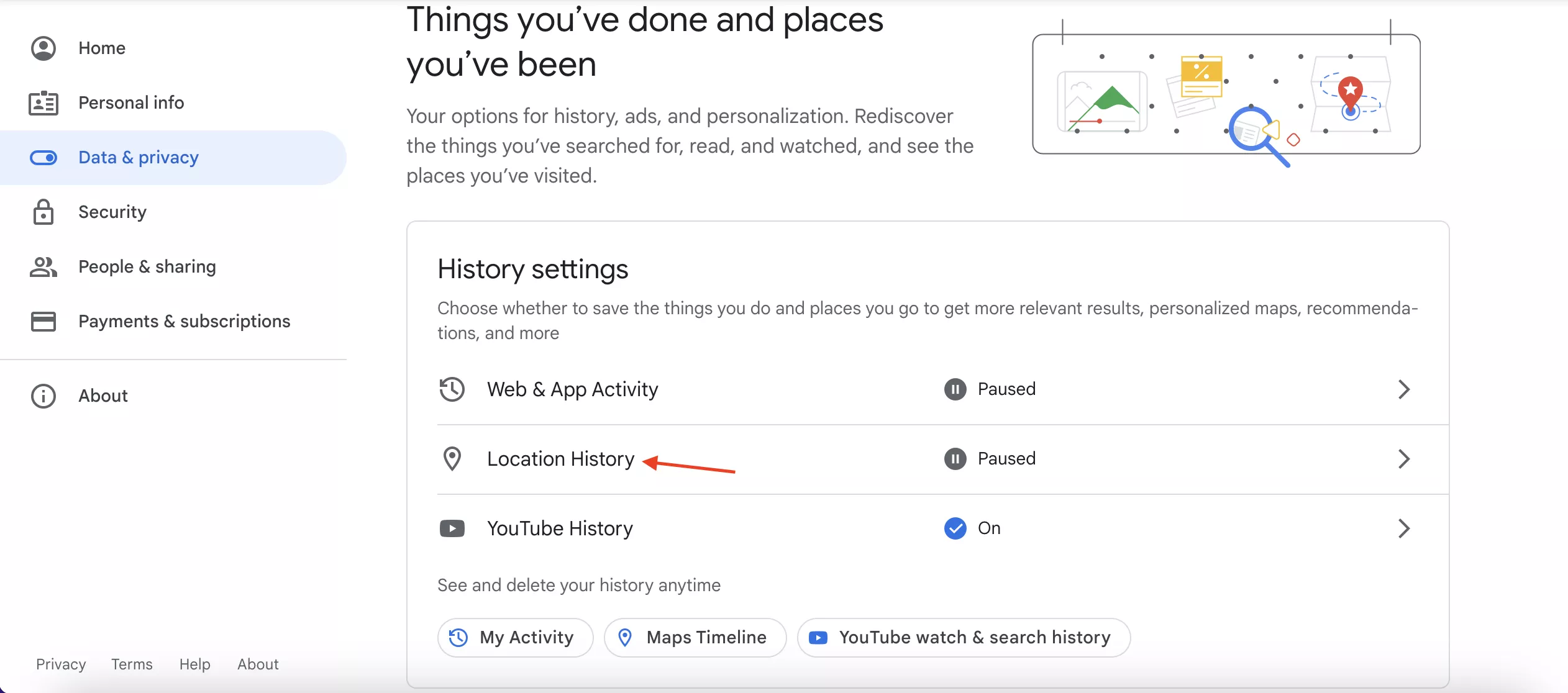
- Hit the Turn off button to disable it.
You can also help prevent tracking of your online activity. First, select Web & App Activity above Location History. Then you can either turn off activity tracking on Google services altogether, view your history on individual apps, or use the auto-delete feature. The last one means that you can set a specific timeframe, and Google will clear out your history after that time. This helps you keep your history when you need it, and then erase it after some time to keep things private.
Play with Google’s settings
Once you’ve checked your ad preferences and histories, we also suggest taking a moment to explore the Data & privacy page altogether with its bunch of settings. This way, you can make informed decisions about your privacy and have a clear picture of what’s at stake and what exactly Google knows about you.
Enhance Your Privacy with a VPN
Another crucial moment is to boost your cybersecurity arsenal. Internet safety and privacy can be overwhelming, yes, but you can handle it step by step to make things easier.
One good idea is using a VPN service. It hides your IP address and online activity from Google and other third parties. All you need to do is go for a reliable provider. Consider using the VeePN app for protecting your privacy and connection speed. It works on all major operating systems and platforms and can be set up in no time. Here’s how to use VeePN for better online security and privacy:
- Check out VeePN’s risk-free plans and create your account.
- Download the app for your device.
- Open the app and connect to the VPN on the main screen.
Note: Upon your first time using the app, VeePN will connect you to Optimal Location. However, you can always connect to a specific country by choosing one of the available server locations.
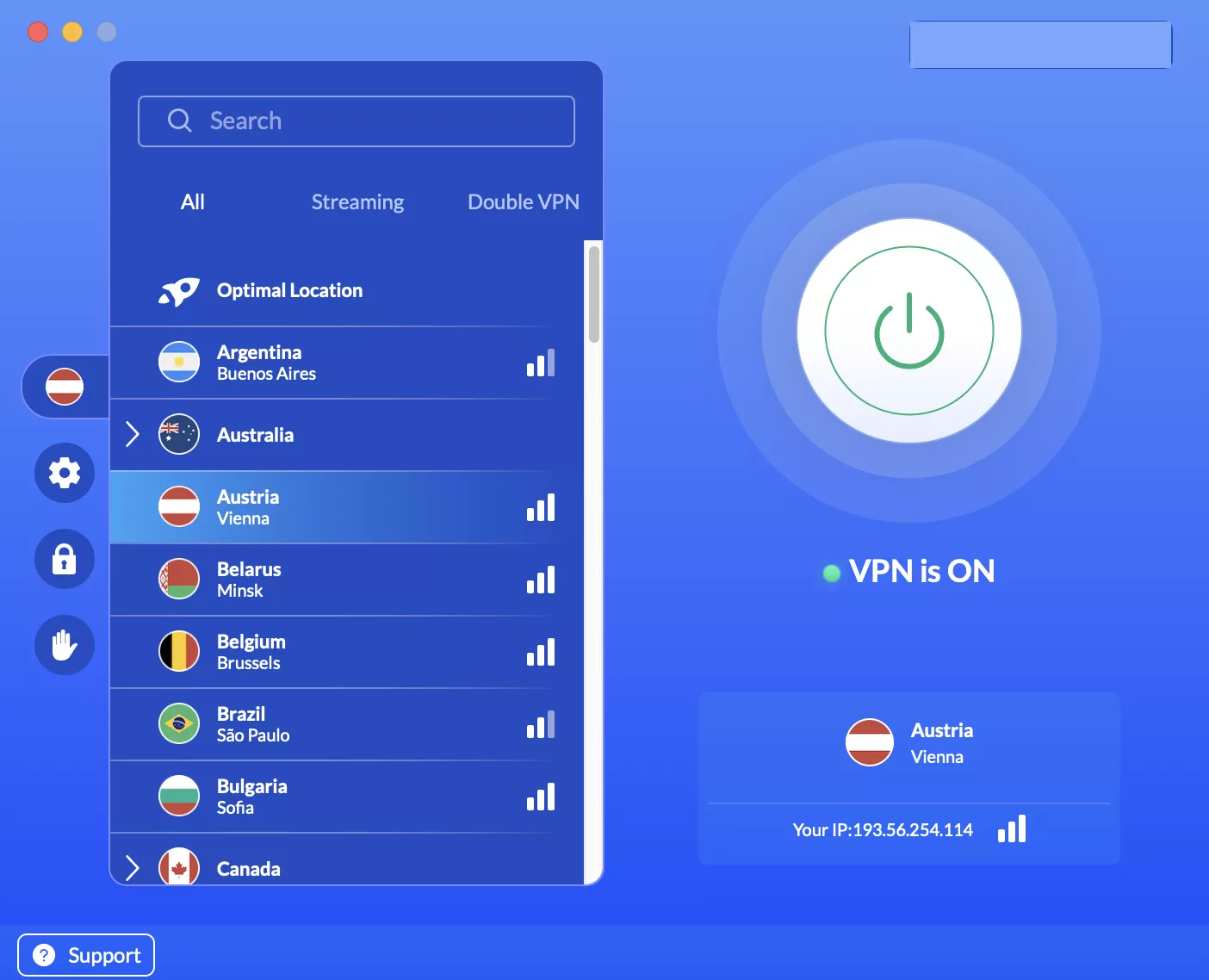
- Browse the web privately with your VPN connection on.
That’s it, you’re all set! With VeePN, you can connect to nearly 90 server locations from all over the world and enjoy a secure connection from anywhere. The app will protect your data with powerful encryption while giving you a new IP address — a “home address” of your device online. This way, you can get better online privacy and not worry about your data being stolen. So why not give it a try?
FAQ: How to See What Google Knows About You
Easy! Log in to your Google Account, go to Data & privacy, and check out the info they’ve got on you. It’s like peeking into your own digital profile!
To learn where to find demographic charts, check out these instructions by Google.
Yes, when you use Google’s services, they can see your web and app activity. They say it’s all for improving your experience and providing relevant results, but you can disable this tracking any time in your Google account under Data & privacy. Find out more in this blog post.
Your Google search history is private — only you can access it from your signed-in account…and Google, unless you disable Web & App Activity tracking in your account. You can also use a VPN to encrypt your data and hide your online activity from third parties. Learn more in this article.
Yes, Google tracks your whereabouts when location services are enabled on your device, even if you’re not using the related apps directly. You can disable location services in your Location History settings. Check out this article to learn what else Google knows about you.
To prevent Google from tracking your search requests, disable Web & App Activity tracking in your account’s settings. Also, consider using a reliable virtual private network (VPN) like VeePN, which encrypts your search queries and provides an additional layer to your Internet privacy.
Yes, you can stop Google from showing personalized adds by taking the following steps:
- Open your Google account.
- Head to the My Ad Center in your Google account settings.
- Turn off ad personalization.
Check out this article for more detailed guidelines.
VeePN is freedom



